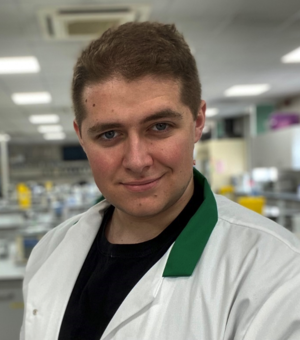Daniel Molland

Daniel is a DPhil in Biochemistry student joining the group investigating the habitability of ocean worlds with protein-based life as part of the first of its kind collaboration between the Department of Biochemistry and the European Space Agency. Daniel previously undertook his Integrated Masters at King’s College London. In the third year of his degree, Daniel joined the Keeble group investigating the antimicrobial behaviour of phospholipase A2 in microgravity as part of the International Space School Educational Trusts’ payload development group. After successfully developing this experiment, it was launched to the International Space Station as part of SpaceX CRS 20.
During the gap between his third and fourth year, Daniel also volunteered for deployment as part of the British Army’s Operation Rescript in response to the Covid pandemic. Daniel built on his early success in his group within his fourth year by continuing on to develop a second protein experiment for launch to the ISS within his master’s year. This experiment aimed to identify how local concentration fluctuations by altered fluid mechanics in microgravity impacted protein function in the urease reaction. Within this, Daniel developed a novel methodology to enable astronauts to visualise track reaction rates of the urease reaction within a NASA safety compliant architecture, which allows accurate determination of the reaction rate through visual analysis of pH indicators alone. This has been approved for launch and is currently slated to launch to the International Space Station on SpaceX CRS26. After completing this development, he was also appointed as the Lead Scientist for the International Space School Educational Trust. Daniels’s success in this field has also received recognition from King’s College London and the Biochemical Society at the end of his degree with the award of a King’s Experience Research Award and an Undergraduate Recognition Award, respectively.
During his undergraduate research, Daniel recognised his ambition to do astrobiology research was blocked by the lack of viable PhD opportunities in this research effort within the UK. To address this, Daniel proposed, designed and developed a research project for funding from the European Space Agency to fund one of the first biochemical astrobiology PhD research projects within the UK. After receiving support from numerous international researchers and gaining a place at the University of Oxford’s Department of Biochemistry under the supervision of Prof Jason Schnell, this research was selected for implementation by the European Space Agency. This new research, aimed at assessing the compatibility of ocean environments with protein biochemistry, seeks to evaluate the capability of Early Mars and Enceladus with the formation of protein-based life. To support this, the research is also backed by collaboration with the ESA Rosalind Franklins RLS instrument team and members of the original NASA Cassini INMS science team, who led the analysis of the Enceladian solvent environment following Cassini flybys up to 2017.
Alongside his research, Daniel oversees the development of experiments for launch to the space station as part of the newly formed Oxford ISSET Payload Research and Development group developing a wide variety of experiments for launch. This is further complemented by Daniels continuing association with King’s College London as a visiting researcher as well as a visiting scholar position at the Blue Marble Space Institute of Science and Co-Research Coordinator at the Space Generation Advisory Council’s Space Medicine and Life Sciences Group.








